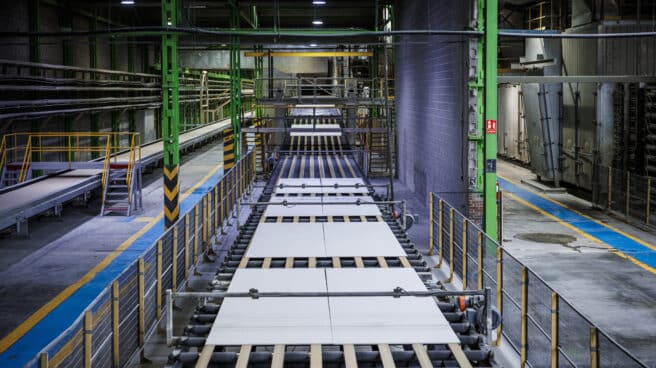

Drywall production process at the Pladur plant, Valdemoro (Madrid)
The most famous laminated plaster in Spain. Drywall, also known as “white gold,” is looking for solutions for 2024, which the company predicts will be marked by “economic instability and volatility in the construction sector.” The future strategy of the leading brand of interior partitions on the Iberian market is based on two fundamental principles: reforms in construction and the use of green hydrogen in its factories.
Enrique Ramirez, CEO of Pladur, revealed the road map the company must follow during a meeting with the media: “Borrowing costs are holding back the purchase and sale of homes, although we hope that the rise in rates will slow down. However, there is a positive fact: assistance in the field of energy efficiency will stimulate building reforms.”
The manager appealed to the government and the value of its stewardship of the Next Generation Funds as they believe the administration’s support will play a key role in the path to green and sustainable building: “Please help us because there is work to be done.”
Ramirez emphasizes that architects, installers and manufacturers are committed to sustainable construction that reduces environmental impact and optimizes resources: “We cannot allow the building – due to heating in winter and air conditioning in summer – to continue to be responsible for more than 40% of energy consumption in Spain and Europe, and we must continue to innovate and take sustainable measures that address this problem.”
Closely observing the revival of the real estate market, “obviously this movement is favorable for us,” Ramirez says, Pladur intends to position itself as a leading player in the transformation of construction. “The adoption of green hydrogen in industry involves a transition to cleaner and more sustainable energy sources, reducing carbon emissions and improving the energy efficiency of industrial production,” says Ramirez.
According to Pladur, the housing stock in Spain is around 25 million and the vast majority of them were built before the Technical Building Code was adopted, so they have very low energy ratings.
For now, Pladur avoids going into detail about what energy will supply them with this clean energy, which will be realized in the second half of 2024 at the Valdemoro plant (Madrid), although they confirm that the gas will come from Castilla-La. Mancha, where Europe’s largest plant for the production of green hydrogen for industrial use is located in Iberdrola).
Construction trend
Ramirez described 2023 as an “atypical” course in which Spain’s electoral periods – with regional and municipal elections in May and general elections in July – cooled the market. According to the Pladur leader, activity during the summer months has improved, in line with the trend in other European countries such as France, Germany, Italy and the UK.
“Despite the volatility of the construction sector, we maintain strong economic expectations and our turnover will be around 210 million euros, in line with the previous year,” says Ramirez, highlighting Pladur’s presence in new construction, which has since continued to grow and helps the company improve its work.
The issue of sustainable development is becoming more important in the business environment every moment. Pladur boasts one of the main advantages of its products: gypsum is a material that can be recycled indefinitely. If a board is defective, it is re-entered into the manufacturing process as many times as necessary.
Currently, Pladur’s production area in the south of Madrid is 40 million square meters, although at maximum production it reaches 70 million. 200,000 liters of water annually provide drinking water for the Valdemoro plant, which is currently trying to minimize its consumption by using rainwater, which is collected and then decanted for use in the chemical processes needed to process the gypsum.
By introducing green hydrogen at the Valdemoro plant in the second half of 2024, Pladur is committed to a “sustainability strategy that aims to minimize environmental impact and promote greener practices in the construction industry.” Ramirez delves into the fact that this alternative action involves higher costs than continuing to use natural gas; However, “this is the price we have to pay for our concern for the environment,” concludes Pladur’s CEO.
Source: El Independiente